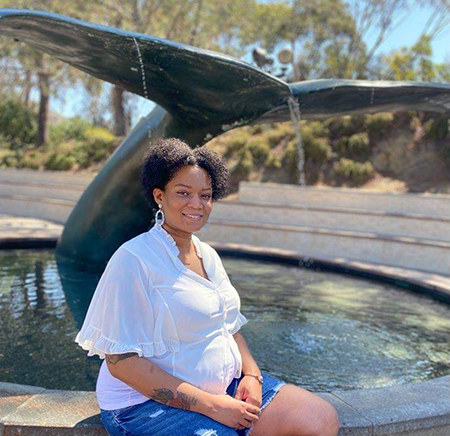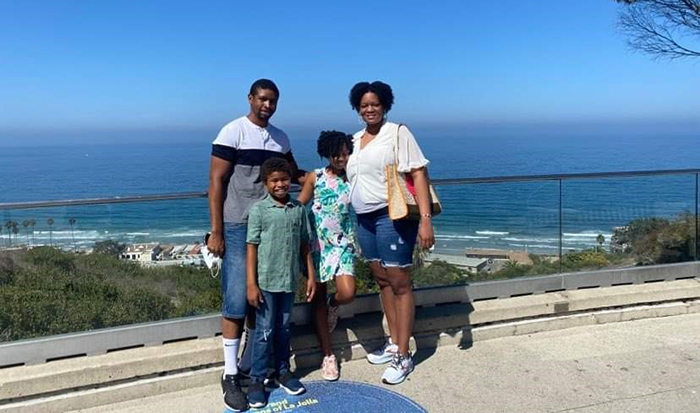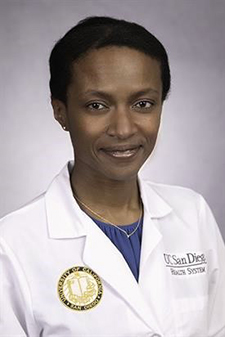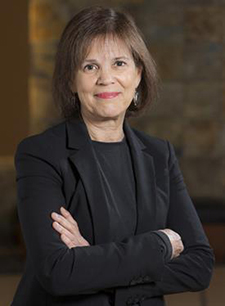
By:
- Nicole Mlynaryk
Published Date
By:
- Nicole Mlynaryk
Share This:
Pregnant, Breastfeeding or Trying? Here’s What COVID-19 Means for You
As the U.S. continues to see low vaccination rates in pregnant people, experts at UC San Diego Health weigh in on the latest research
Hear more about Faniel and our experts in the latest episode of UC San Diego Health’s podcast N Equals One.
With holidays and winter weather approaching, concerns about COVID-19 infections are on the rise. But despite increasing access to vaccines and booster shots, one group continues to show low vaccination rates. Only one-third of pregnant people are fully vaccinated in the U.S., and the rates are even lower for pregnant people of color. These numbers recently prompted the Centers for Disease Control and Prevention (CDC) to request “urgent action” on the issue, after they officially recommended vaccination during pregnancy back in August.
So, what’s keeping this group, who are at increased risk for severe infection, from getting vaccinated? For many expecting parents, this may feel like one of the first big decisions they will make for their child, and that pressure can stall even the most pro-science parents.

San Diego mother Jasmine Faniel spoke with her doctors at UC San Diego Health before deciding whether to get vaccinated while pregnant.
Jasmine Faniel, a patient at UC San Diego Health, shared these concerns with her obstetrician earlier this year. Faniel and her partner Glenn, an aviation technician for the U.S. Navy, were excited to expand their family this fall, but weren't sure if she should be vaccinated right away. They were gravely aware of the potential consequences of COVID-19 after having several friends die from the disease. But as a stay-at-home mother to her 9-year-old daughter, Faniel was also worried about taking any risks that might affect her children.
“I asked if it was safe to take while pregnant and the doctors said that it was up to the pregnant person, but they didn't really have the complete data,” Faniel said, recalling an early doctor visit last spring. This initial uncertainty was also compounded by strong social pressures. With so many still doubting the safety of vaccines during pregnancy, Faniel worried about being judged by others who might disapprove.
“I felt like if anything were to happen to the baby and they found out that I had the vaccine, everybody would think it was because of the vaccine,” she said, “so I did feel the pressures of that, definitely.”
But Faniel knew she was making an active and important choice for her health either way. As she continued to speak with her doctors through the spring and summer, she also started seeing more frequent stories of unvaccinated parents dying amid the Delta surge. After several months of consideration, she was finally ready to make her choice.
“Those stories really hit home for me because my children are my everything, and I just couldn't imagine making one simple mistake and I'm gone out of their life,” she said.
On a sunny day in August, a pregnant Faniel was vaccinated against COVID-19. When asked how she feels about her choice now, she sounds relieved.

Jasmine Faniel, Glenn Rosser, and their children recently welcomed a new baby boy into their family.
“I feel happy because I know that if I were to contract COVID-19, my chances of survival are greater,” she said. “I just feel safer knowing my baby has a fighting chance, having the antibodies to fight off everything if they were exposed to it. And I'm just grateful that I have access to that because other countries don't have the same opportunities we have.”
After a whirlwind year, Faniel and her partner welcomed a healthy baby boy to the family at the end of October.
“Everything is good,” she said. “He’s finally here!”
For those still deciding whether or not to get vaccinated, our UC San Diego Health experts are here to weigh in on all the latest research and recommendations.
COVID-19 Infections

Dr. Cynthia Gyamfi-Bannerman, serves on the Society for Maternal-Fetal Medicine COVID-19 Task Force.
COVID-19 infections are more severe in pregnant people
“Early on in the second trimester, women become more short of breath,” said Dr. Cynthia Gyamfi-Bannerman, chair and professor of Obstetrics, Gynecology, and Reproductive Sciences at UC San Diego Health. “As the uterus grows it essentially compresses the diaphragm and your lung capacity becomes smaller, so that when you have a respiratory infection it’s actually harder to fight.”
Gyamfi-Bannerman was one of the first health care workers in the U.S. to report outcomes of pregnant people infected with COVID-19. She explains that pregnant people are more likely to be admitted to the intensive care unit (ICU) and require intubation and ventilator support. They also have a 70 percent increased risk of death from COVID-19 compared to non-pregnant people.
Physicians have already seen this play out with other respiratory infections, such as influenza, which is why pregnant people are consistently encouraged to get flu shots. Pregnancy actually weakens the body’s immune system, so the sooner these antibodies are present, the better.
COVID-19 infections increase pregnancy risks
“With the infection, we see an increased risk of stillbirth and a doubling of incidents of preterm delivery, so mothers are delivering earlier than would be expected,” said Christina Chambers, a perinatal epidemiologist and professor of pediatrics at UC San Diego School of Medicine and the Herbert Wertheim School of Public Health and Human Longevity Science. Chambers’ research team has enrolled more than 2,500 pregnant and breastfeeding people in a series of studies on COVID-19 infections and vaccines.
Infected family members must take precautions around newborns
Gyamfi-Bannerman encourages infected parents to stay six feet apart from newborns as much as possible, but says breastfeeding is safe as long as the infected mother is masked and practicing hand and breast hygiene. With holiday gatherings approaching, she emphasizes that “now is the time to definitely be masked if you're interacting with a newborn.”
“This pandemic is just kind of ongoing,” she said, “but if there's any concern, it's just not the time to come and visit a newborn.”
COVID-19 Vaccines
Historically, most clinical trials haven’t included pregnant or breastfeeding people
“There's not a good reason for it,” said Gyamfi-Bannerman. “It's not that there was a concern related to pregnancy for this particular drug, but it was more historic in that pregnant people are often excluded from clinical trials, and we saw the results of that.” She notes that many physicians and researchers are advocating to change this policy on clinical trials, and there are now several published studies evaluating vaccine safety in pregnant people.
COVID-19 vaccine side effects are similar for everyone, even if pregnant or breastfeeding

Christina Chambers the lead investigator for MotherToBaby Pregnancy Studies, which assess the safety of medications and other exposures in pregnancy.
“We don't see anything different with the vaccine; they're the same side effects that we see in the general population,” said Chambers, whose research team has been studying this question all year. They also did not find any serious side effects in the babies when mothers were vaccinated while breastfeeding.
COVID-19 vaccines do not affect fertility
“There really is no evidence that this vaccine, new technology or not, has the potential to do anything that would interfere with fertility,” said Chambers. “The CDC data do not suggest an increased risk of miscarriage with any of the vaccines, and we're looking at that as well to try to provide reassurance.”
Gyamfi-Bannerman adds that people undergoing in-vitro fertilization (IVF) right after being vaccinated showed the same fertility rates as people who weren’t vaccinated, and their pregnancy outcomes were the same.
COVID-19 vaccines do not affect pregnancy outcomes
“We have quite a bit of data now to show that there's no difference in stillbirth rates or preterm birth rates with the vaccine,” said Gyamfi-Bannerman. The CDC’s latest data also shows no evidence of increased birth defects following vaccination. On the flip side, the vaccine actually reduces pregnant people’s risk of infection and severity of symptoms, which include health issues known to contribute to birth defects.
Antibodies that protect against COVID-19 can be passed from mother to baby
“That's probably one of the biggest benefits to getting vaccinated during pregnancy,” said Gyamfi-Bannerman. “The antibodies have been found in the umbilical cord blood, so they're transported to the babies, and the babies who have been tested have similar antibody levels to the moms. So it really is a nice way to protect the newborn as well as protect yourself.”

Lars Bode is the director of MOMI CORE, a center that studies the makeup of breast milk and its impact on human health.
“We’ve also shown that when a lactating person has antibodies against COVID-19, those antibodies make it into their breast milk and can potentially protect the infant,” said Lars Bode, a professor of pediatrics and director of the Larsson-Rosenquist Foundation Mother-Milk-Infant Center of Research Excellence at UC San Diego School of Medicine. He notes that researchers still have to confirm the antibodies are being sufficiently taken up by the baby this way, but studies on this are happening now.
Official milk banks are safer than buying breastmilk from online vendors
In a recent trend, parents have been sharing breast milk with each other and even buying it from online vendors such as Craigslist in an attempt to give their babies and young children a source of COVID-19 antibodies. This may be especially tempting for people struggling to breastfeed, but Chambers and Bode advise parents to exercise caution and recommend using official milk banks when possible.
“I highly recommend that you go through channels that are testing the milk properly and ensuring that it's safe,” said Bode, “otherwise you're setting yourself up for more trouble than what you're probably getting in protection.”
Expert takeaways
“There are so many questions being raised that are asking us to prove the negative,” said Chambers.
“Demonstrate to us that there's no increased risk for developing Alzheimer's 50 years from now, or no increased risk for having your child do less well in high school. Those questions can't possibly be answered now and have never been answered for any vaccine prior to it being rolled out, so I think that's the biggest misunderstanding.”
“I can tell you what I tell my sisters and my family members—you should 100 percent get vaccinated,” said Gyamfi-Bannerman. “If it were me I would have been vaccinated during pregnancy. It really is the right thing to do.”
Share This:
You May Also Like
Stay in the Know
Keep up with all the latest from UC San Diego. Subscribe to the newsletter today.


